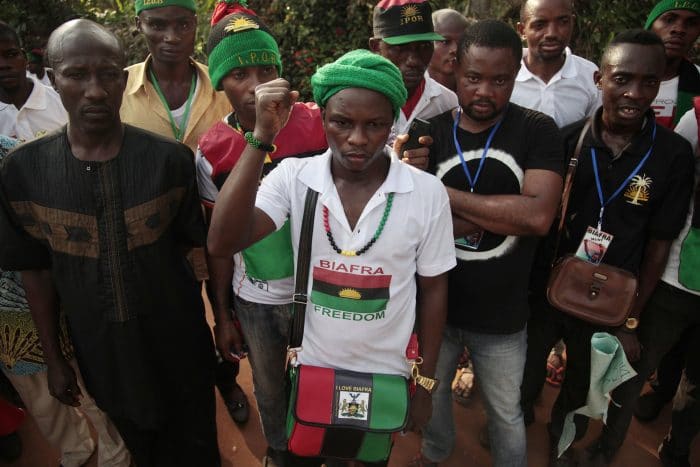Nigeria’s decision to designate a group campaigning for an independent state of Biafra as “terrorist” and ban it runs the risk of backfiring.
A federal high court in the capital, Abuja, on Wednesday granted an application by President Muhammadu Buhari’s attorney general to proscribe the Indigenous People of Biafra, known as Ipob, designating it as a terrorist organization. The move came as tensions escalated in southeastern Nigeria, with the group’s leader, Nnamdi Kanu, threatening to disrupt state elections unless there’s a vote on secession and his supporters clashing with the security forces.
“We saw in videos young people willing to confront the military with their bare hands,” Freedom Onuoha, a senior lecturer of political science at the University of Nigeria in the southeastern town of Nsukka, said by phone. “This designation may be the beginning of a formal radicalization of the group.”
Nigerian security forces already have their hands full in the battle in the northeast against the insurgent group Boko Haram, whose campaign to impose its version of Islamic law has left tens of thousands of people dead since 2009 and pushed the region to the brink of famine. Africa’s top oil producer grapples with sporadic militant attacks in the southern oil-rich Niger River delta, which last year cut monthly oil shipments to the lowest in about three decades.
Courting Danger
The government is courting danger by treating Kanu in the same manner as Abubakar Shekau, the leader of the Boko Haram faction who has declared loyalty to Islamic State, said Idayat Hassan, the director of Abuja-based Centre for Democracy and Development.
“Designating Ipob as a terrorist group means that we’re pushing them into guerrilla warfare,” she said by phone. “We could have just banned the group. Going ahead to declare it a terrorist organization is too much.”
The drive for secession in the southeast sparks deep anxiety in Nigeria, where a bid to establish an independent Biafra sparked a 1967-70 civil war that claimed more than a million lives. Among some Igbos there is a sense that since the end of the conflict, they have been marginalized politically. Three of Buhari’s 17 top officials in positions in the army, navy, air force and other security agencies are from the south, and none of them are Igbo, one of the three biggest ethnic groups along with the Hausa-Fulani and the Yoruba.
The unrest in the southeast comes at a delicate time for Africa’s biggest economy, which narrowly exited recession in the second quarter, ending the worst slump in 25 years, and has seen unemployment rise to 14.2 percent, according to the National Bureau of Statistics.
Investors Watching
“I don’t see the designation in and of itself having an impact on investment,” Amaka Anku, Africa analyst at Eurasia Group, said by phone from Abuja. “What we’ll be watching is what happens next and if insecurity worsens.”
The government pursued the ban to “ensure peace and make sure that this doesn’t degenerate,” Ministry of Justice spokesman Salihu Othman Isah said by phone from Abuja. “There are still openings for anyone who feels it’s not right to make their case.”
Kanu, 45, holds dual Nigerian-British citizenship and until two years ago was in London running his pro-independence Radio Biafra. Since his return to Nigeria, he’s faced a series of court cases as he built a following of mostly unemployed young people. He was freed on bail in April while facing treason charges. His whereabouts have been unknown since security forces raided his residence on Sept. 14, his lawyer, Ifeanyi Ejiofor, said in a statement Wednesday.
‘Terrorist Organization’
Last week, a military spokesman described Ipob as a “militant terrorist organization” after clashes between some of its supporters and troops left several dead and injured. Governors of five states where the group is active jointly announced they were banning it. The government submitted the application to the Federal High Court after Senate President Bukola Saraki said the move to designate Kanu’s group as terrorist was unconstitutional and without legal backing.
Even with the rubber-stamp of the court, Onuoha and other analysts think the state will have a hard time proving its case.
“The terrorism act defines what terrorism is and an appeal would force the state to prove that the group bears arms,” Onuoha said. “The government would have to have verifiable evidence, such as videos. Civil disobedience does not amount to terrorism. The possibility of winning an appeal is very high.”
— With assistance by Dulue Mbachu

